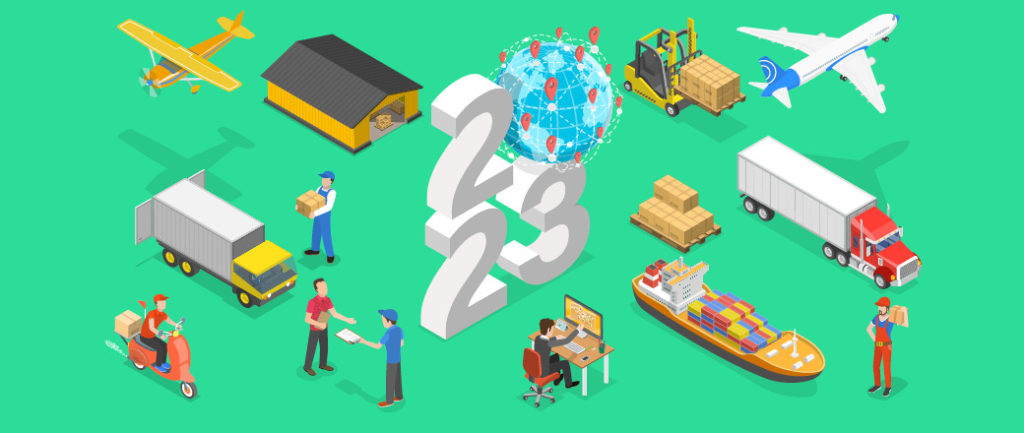Here we examine the challenges of 2022 and the transportation trends that will define 2023.
Biggest Transportation Challenges & Biggest Victories in Supply Chain 2022
The Russia-Ukraine conflict created additional challenges for the supply chain in 2022. In addition to causing a massive increase in global oil and fuel prices, the conflict also disrupted marine operations. Since 10% of global seafarers are Russian and 4% are Ukrainian, this put additional strain on the supply chain and contributed to ongoing labor shortages.
Transportation & Logistics Trends for 2023
MercuryGate Co-Founder and Chief Innovation Steve Blough discussed looming logistics trends in 2023 with Chainalytics Vice President of Transportation Kevin Zweier. Some of the logistics trends they discussed in our Q4 Logistics Landscape webinar include the following.
Autonomous Logistics
Creating workflow efficiencies is critical for success in labor-constrained markets. Technologies to automate mode and carrier selection, route planning, and tracking processes will continue to gain traction in the year ahead.Visibility for Dynamic Execution
Identifying issues early is a key component of visibility, but dynamic exception management will be a driving trend in 2023. Automated control-tower systems that can push corrective action are ideal, but systems that alert teams and guide decision-making will also see growth.
Digital Freight & Dynamic Rate Management
While overall capacity issues are easing, volatility on the lane level is still rampant. Many companies will look to digital freight and dynamic rate management solutions as they adapt to real-time market shifts and protect transportation budgets.
Diversified Networks
In the face of crumbling routing guides and pandemic-driven spot market chaos, shippers were forced to expand and diversify their carrier networks. Despite returning to a softer market, companies will continue engaging and building relationships with a more extensive network to be better protected when disruption hits again.Analytics
Supply chain data analytics gives clarity and transparency to what is happening on the freight side of a business. Visualizing how fuel impacts freight costs through metrics like cost per mile or cost per pound in and out of a facility is critical to understanding how well things are moving toward plan.Sustainability
The conversation about sustainable supply chains cooled at the height of the pandemic disruption, but global carbon reduction initiatives are back in full swing. Expect to see sustainability questions in RFPs and plan to show quantitative metrics on carbon emissions and reductions in 2023.Security
Security should always be a high priority, especially in an increasingly digital, cloud-based industry. Recent data breaches and ransomware issues increased consumer awareness, so companies will focus on data security across their systems next year.
2023 Forecast: Rising Challenges, Receding Problems
Shippers will be focused on resiliency and strategically planning for the next transportation challenges that affect the supply chain. Now is the time to reassess transportation strategies and partnerships and do extensive scenario planning. Below are a few more predictions for the year ahead.
Rate Stabilization
Truckload, LTL, intermodal, and ocean should all expect to see stabilization, and possibly further reductions, in rates. Parcel will likely continue to increase but at a much slower pace.
E-commerce & Omnichannel Pressures
Demand for e-commerce will continue driving pressure for distributed deliveries and more B2C shipments. Shippers will rely more on automated route optimization to enhance transportation efficiencies and ensure each movement in the supply chain is in the right mode for the right price.
Demand Forecasting Challenges
Forecasting demand for products and transportation will present a challenge. Inventory build-ups due to supply chain sluggishness, a return to consumer spending in services, and economic inflation have everyone asking – what will happen to demand?Labor Shortages
Strikes and slowdowns will add to labor challenges and reinforce the need for flexible, resilient supply chains. Companies will continue implementing automation solutions for repetitive, manual tasks to combat ongoing labor shortages.
Long-term Sustainability Strategies
With the growing demand for green products and increasing governmental pressure for environmentally-friendly practices, business sustainability will be closely tied to environmental sustainability. Shippers will seek to minimize carbon impact through route optimization, transportation collaboration, and commitment to quantifiable carbon measurements.
Calculate your potential Saving While Using an enterprise TMS
Stay Informed and Adaptable in 2023
To learn more about the transportation challenges and logistics trends shaping 2023 and how advanced TMS control-tower solutions are leading the way, watch the Logistics Landscape Webinar now.


